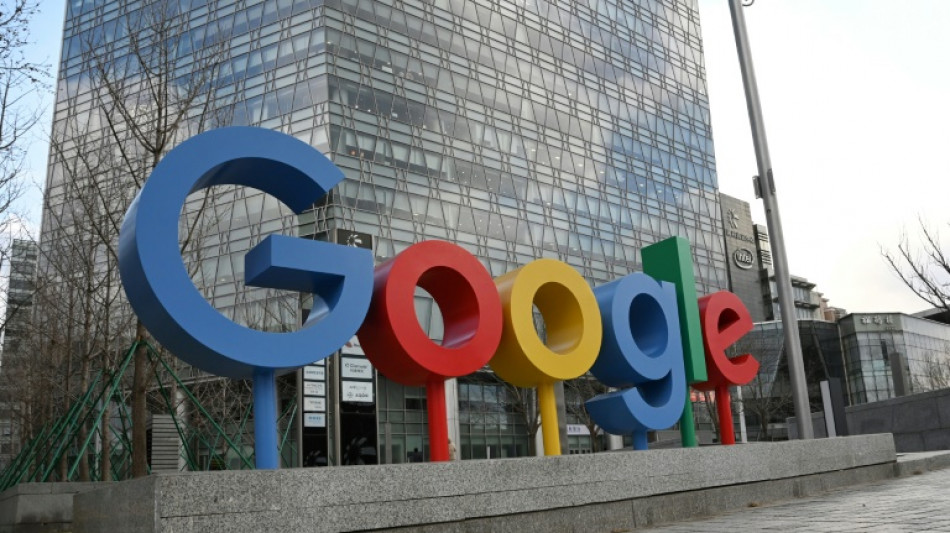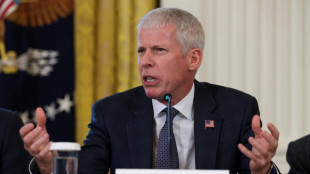
-
 'Climate cult' hurts Europe's economy, US energy secretary tells AFP
'Climate cult' hurts Europe's economy, US energy secretary tells AFP
-
Peru's presidential musical chairs

-
 France arrests nine over far-right activist's killing
France arrests nine over far-right activist's killing
-
France arrests seven over far-right activist's killing

-
 Frostad dethrones Ruud in Olympic freeski big air thriller
Frostad dethrones Ruud in Olympic freeski big air thriller
-
Galatasaray thrash 10-man Juve in Champions League play-off 1st leg

-
 Woods return timeline uncertain, but won't rule out Masters
Woods return timeline uncertain, but won't rule out Masters
-
Dozens of film figures condemn Berlin Film Festival 'silence' on Gaza

-
 Iran, Ukraine talks spark diplomatic merry-go-round in Geneva
Iran, Ukraine talks spark diplomatic merry-go-round in Geneva
-
Canada launches huge defence plan to curb reliance on US

-
 US says will match alleged Chinese low-yield nuclear tests
US says will match alleged Chinese low-yield nuclear tests
-
Alcaraz battles into second round of Qatar Open

-
 Russians, Belarusians to compete under own flags at Paralympics: IPC tells AFP
Russians, Belarusians to compete under own flags at Paralympics: IPC tells AFP
-
Bayer proposes class settlement for weedkiller cancer claims

-
 Gauff, Rybakina cruise into Dubai last 16
Gauff, Rybakina cruise into Dubai last 16
-
Greenland entrepreneur gambles on leafy greens

-
 Father of US school shooter goes on trial on murder charges
Father of US school shooter goes on trial on murder charges
-
Iran, US agree on 'guiding principles' for deal at Geneva talks: Iran FM

-
 Warner Bros. gives Paramount one week to outbid Netflix
Warner Bros. gives Paramount one week to outbid Netflix
-
Russians, Belarusians allowed to compete under own flags at 2026 Paralympics: IPC tells AFP

-
 Ukrainian wife battles blackouts to keep terminally ill husband alive
Ukrainian wife battles blackouts to keep terminally ill husband alive
-
Pollock handed first England start for Ireland visit

-
 Oil prices fall back as 'hopeful' Tehran responds to Trump
Oil prices fall back as 'hopeful' Tehran responds to Trump
-
Arteta welcomes Madueke and Saka's competition for places

-
 France and India hail growing ties as Modi hosts Macron
France and India hail growing ties as Modi hosts Macron
-
Warner Bros. says reopening talks with Paramount on its buyout offer

-
 Slalom showdown Shiffrin's last chance for Milan-Cortina medal
Slalom showdown Shiffrin's last chance for Milan-Cortina medal
-
Protesters march in Kosovo, as ex-president's war crimes trial nears end

-
 No pressure on India opener Abhishek after two ducks, says coach
No pressure on India opener Abhishek after two ducks, says coach
-
Sakamoto eyes figure skating gold in Olympic farewell

-
 Pereira 'trusts' Forest owner Marinakis despite three sackings this season
Pereira 'trusts' Forest owner Marinakis despite three sackings this season
-
AI 'arms race' risks human extinction, warns top computing expert

-
 Israeli bobsleigher dismisses Olympics 'diatribe' by Swiss TV commentator
Israeli bobsleigher dismisses Olympics 'diatribe' by Swiss TV commentator
-
Supreme leader says Iran can sink US warship as Geneva talks conclude

-
 Australia, Ireland out of T20 World Cup as Zimbabwe qualify after washout
Australia, Ireland out of T20 World Cup as Zimbabwe qualify after washout
-
Greece experts to examine Nazi atrocity photos find

-
 Los Angeles mayor calls for 2028 Olympics chairman to step down over Epstein files
Los Angeles mayor calls for 2028 Olympics chairman to step down over Epstein files
-
Evenepoel takes UAE Tour lead with time-trial win

-
 Oil prices rise as Trump ramps up Iran threats
Oil prices rise as Trump ramps up Iran threats
-
EU investigates Shein over sale of childlike sex dolls

-
 Bangladesh's new PM, political heir Tarique Rahman
Bangladesh's new PM, political heir Tarique Rahman
-
Rain threatens to knock Australia out of T20 World Cup

-
 US civil rights leader Jesse Jackson dies at 84: family
US civil rights leader Jesse Jackson dies at 84: family
-
Trump's new envoy arrives in South Africa with relations frayed

-
 Jesse Jackson: civil rights lion sought 'common ground'
Jesse Jackson: civil rights lion sought 'common ground'
-
Iran, United States hold new talks in Geneva

-
 Tariq confident Pakistan can bounce back after India drubbing
Tariq confident Pakistan can bounce back after India drubbing
-
Being back in the USA 'feels amazing', says Vonn

-
 New Zealand cruise into Super Eights at T20 World Cup
New Zealand cruise into Super Eights at T20 World Cup
-
Moscow, Kyiv meet for US-brokered talks after fresh attacks


US judge rules against Google in online ad tech antitrust case
A US judge on Thursday ruled that Google illegally wielded monopoly power in the online ad technology market, in a legal blow that could rattle the tech giant's revenue engine.
The federal government and more than a dozen US states filed the antitrust suit against Alphabet-owned Google, accusing it of acting illegally to dominate three sectors of digital advertising -- publisher ad servers, advertiser tools, and ad exchanges.
It is one of two federal suits targeting Google that could ultimately see the company split up and curb its influence -- and part of a wider government push to rein in Big Tech.
The vast majority of websites use a trio of Google ad software products that together leave no way for publishers to escape Google's advertising technology, the plaintiffs alleged.
District Court Judge Leonie Brinkema agreed with most of that reasoning, ruling that Google built an illegal monopoly over ad software and tools used by publishers, but partially dismissed the argument related to tools used by advertisers.
"Google has willfully engaged in a series of anticompetitive acts to acquire and maintain monopoly power in the publisher ad server and ad exchange markets for open-web display advertising," Brinkema said in her ruling.
"Google further entrenched its monopoly power by imposing anticompetitive policies on its customers and eliminating desirable product features," she wrote.
"In addition to depriving rivals of the ability to compete, this exclusionary conduct substantially harmed Google's publisher customers, the competitive process, and, ultimately, consumers of information on the open web."
Google quickly vowed to appeal the ruling.
"We won half of this case and we will appeal the other half," the company's vice president of regulatory affairs Lee-Anne Mulholland said in a statement.
"The court found that our advertiser tools and our acquisitions, such as DoubleClick, don't harm competition," Mulholland said.
For Emarketer senior analyst Evelyn Mitchell-Wolf, "the bigger picture is crystal clear: the antitrust tides have turned against Google and other digital advertising giants."
"The extent of the fallout will depend on the legal remedies employed, and the implementation timeline is likely to span years if Google loses its anticipated appeals," Mitchell-Wolf told AFP.
- What to do? -
Launched under the presidential administrations of Donald Trump and Joe Biden, five major antitrust cases from the Federal Trade Commission and the US Justice Department are proceeding against major US technology companies.
These cases represent a significant and aggressive shift in antitrust enforcement, after a relatively quiet period in antitrust prosecution since the Microsoft case in the late 1990s.
In August last year, a US judge ruled that Google maintained a monopoly with its dominant search engine. The company has appealed that ruling as well.
Online advertising is the driving engine of Google's fortune and pays for widely used online services such as Maps, Gmail, and search offered free.
Money pouring into Google's coffers also allows the Silicon Valley company to spend billions of dollars on its artificial intelligence efforts, as it tries to keep up with its rivals.
Brinkema gave attorneys on both sides of the online ad tech case seven days to submit a schedule for arguing their positions regarding what remedies should be imposed on Google.
Ordering Google to spin off its ad publisher and exchange operations is likely to be among the plaintiffs' proposals.
For Mitchell-Wolf, the ruling has "profound implications for the advertising industry."
"The open web is so deeply rooted in Google's advertising technology that any change to the status quo could crush vulnerable publishers," the analyst said.
F.Bennett--AMWN

